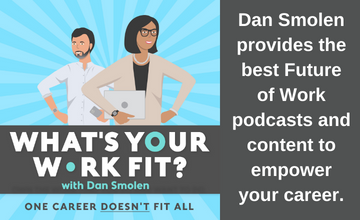Podcast: Play in new window | Download (Duration: 7:10 — 9.9MB)
One key outcome in how we work and where we work is fast emerging: a workforce revolution supports hybrid work.
The radical shift in our podcast’s branding inspired us to explore deeply the suddenly changing nature of work. Not surprisingly, we found that hybrid work has emerged as the way many of us will operate, splitting time each week between home and office.
“[The revolutionary forces] unleashed by the pandemic are numerous. But the-most notable paradigm shift is that people who work full-time are getting the tools they need to make work a successful part of their day.”
In this episode, we highlight fresh insight from SkillCrush which supports the workforce revolution to hybrid work. When remote work options are available:
- People become more focused on the job;
- Workers better manage their mental health, and;
- Introverts (half of the total workforce) gain solitude and control over interpersonal engagements, making them happier and more successful.
A workforce revolution that supports hybrid work is happening now.
Last week, we discovered that 80 percent of people who work full-time will opt for hybrid work.
“There is much to be worked out to make hybrid work a successful option. People who share time at home with children are still struggling to create a sense of balance.”
Still, when people who work full-time are allowed to work in a remote or hybrid fashion, they will become happier. What is more, hybrid work helps them make work part of a day, and not the day. Their relationships with co-workers and family members will become stronger and more fulfilling.
EPISODE DATE: October 23, 2020
